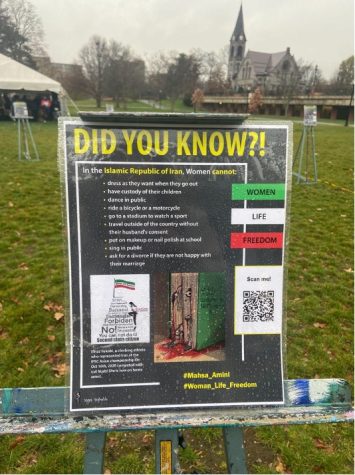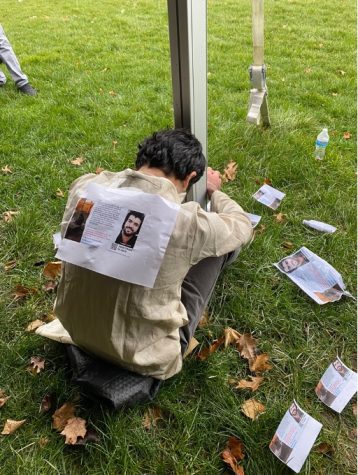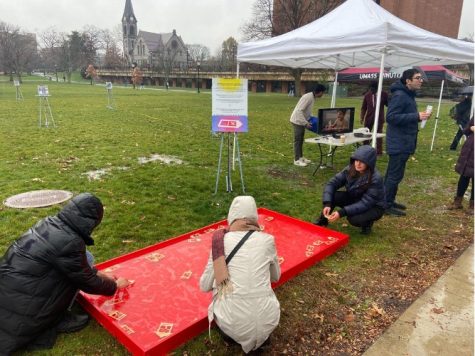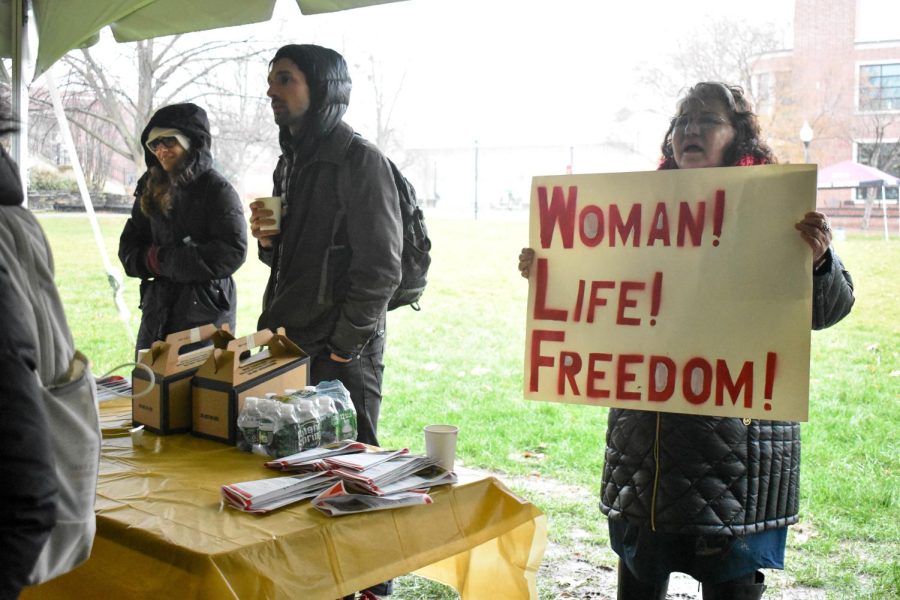On Wednesday, the University of Massachusetts Iranian Graduate Student Association, with support from other campus organizations including the Persian Student Association, held a rally in support of protests occurring across Iran.
Protests have been occurring in Iran over the past two months, beginning as a result of the killing of 22-year-old Mahsa Amini by the Iranian government. Amini was arrested by Iran’s “morality police” for reportedly wearing her hijab in a way that showed some of her hair. Since her death on Sept. 16, Iranians across the globe have been protesting for the rights of women in their country.
An Iranian general confirmed that 300 people have been killed since the start of the protests, with Human Right Activists in Iran calculating over 400 protestors being killed in that fight, leading to a global hashtag emerging in memory of Amini — #MahsaAmini.
In Iran, women are required to wear a hijab so that their hair is covered; “morality police” across the country are in charge of regulating dress — like head coverings — and behavior. Amini was beaten over the head while detained and died three days after. Iranian officials said her death was a result of “underlying disease,” while protestors argue that the cause was the coma she was in as a result of the beating she received at the hand of police.

Ella Adams / Daily Collegian.
The rally outside of the Student Union was part of an international event of solidarity at university campuses across the globe, organized by Iranian Scholars For Liberty — an international organization that works to amplify Iranian voices and raise global awareness of Iranian events and rights. Over 200 universities are said to have participated in Nov. 30’s protest.
Approximately 50 undergraduate and graduate students, faculty and community members gathered on the Student Union north lawn under a tent to keep dry from the falling rain. Informational handouts with individual stories of Iranians’ deaths caused by the Iranian government were given to rally attendees. Pictures of those who died in the killings were printed on flyers, with QR codes to the Iranian Scholars for Liberty website.
Protesters were given a booklet of both Persian and English lyrics to Iranian protest songs that they said voice the heart of the movement. The lyrics to the protest anthems were screened on a television under the tent, along with videos of Iranians standing up to the oppression of the authoritarian regime.
An organizer of the event, Iman Deznabi, is an Iranian graduate student at UMass.
“I’m standing here today to ask you to invest in people of Iran instead of serving their murderers. I am standing here today to ask you to stop legitimizing this incarnation of evil, to stop saving this bloody regime. The time for talk is over,” Deznabi said to the crowd. “We are tired of your empty words.”
“I’m standing here today to tell you people of Iran don’t need you to save them. Believe me, they are more than capable of saving themselves. They only want you to stop saving their murderers,” Deznabi continued.
Moving from sadness, to anger and finally to hope through it all, he said, has allowed Iranians to see the possibility of a future without this regime.
“It is time to treat this regime like what it really is, a terrorist organization and a cancerous tumor that have been spread long enough,” Deznabi said.
“It is time for women all over the world to fight for precious lives in every corner of this world, to come into freedom for every person on this earth. I’m standing here today to ask you to believe in ‘Woman, Life, Freedom,’” to which the crowd chanted back to Deznabi, “Woman, Life, Freedom” — a call to action that spurred from Amini’s killing. The phrase stands as a central emblem for the women-led protests occurring across Iran.
Darya Iranmanesh, president of the UMass Undergraduate Persian Students Association and public health major, condemned the actions of the Iranian government and talked about her experience as a child of immigrants, as her parents moved from Iran to the U.S. before she was born.
“I am calling for Chancellor Subbaswamy — who has not so much as said a public acknowledgement for the pain and suffering of the Iranian people and how that may impact students at UMass Amherst — I’m asking for a public statement condemning the Islamic regime that is sent to the entire UMass community.” Iranmanesh said.
Iranmanesh is also calling for an allocation of counseling services for Iranian students who need support and wishes to establish a PSA support group to offer to Iranian students.
She asked the crowd to send emails to the chancellor requesting that he make a public statement in support of the Iranian protestors. “Chancellor Subbaswamy, I hope you know that many Iranians have contributed to the numbers UMass brags about on their website, especially when it comes down to our highly ranked STEM program,” Iranmanesh said.
Iranian students crafted a formal email to the chancellor requesting that he and his administration make a public statement to condemn the Iranian regime. No action has been taken by Chancellor Subbaswamy, according to Iranmanesh, which she said is causing many Iranian students to question their choice to go to school at UMass.
Some Iranian students are facing the possibility of having to return to Iran after graduation. Amirmahdi Mirfakhr, a PhD student, said that the visa process is a “stressful moment for students.”
“Many students who are working here are still in danger because they cannot return back to Iran,” Mirfakhr said.
Nikou Nikoumanesh, vice president of the Iranian Graduate Student Association and in her second year of her masters for kinesiology, echoed this concern. She explains that she wants Chancellor Subbaswamy to “try and do something that at least postpones this process to stay here” for longer in the U.S. after Iranian students graduate.
Along with speakers and songs, the students organized two exhibits to display the violence of the Iranian regime. One of the exhibits was a performance art, in which a student tied himself to a leg of the tent with his mouth covered with tape and a poster explaining the incident taped to his back.
The poster told the story of Khodanur Lojei, a man who was shot Sept. 30 by Iranian government forces during Friday prayer. The student’s posture mirrored Lojei’s treatment by Iranian officials who arrested him a few months prior to his death and tied Lojei to a flagpole as a means of torture. After asking for water, Iranian officials placed a water bottle in front of Lojei just out of his reach so he could not drink it.

Caitlin Reardon / Daily Collegian.
At a pathway of posters leading up to the large tent on the lawn, there was another exhibit involving a red pool of water with little wooden boats in it, an additional tent and a video playing. The exhibit was in memory of Kian Pirfalak, a nine-year-old killed on Nov. 18 by the Islamic Republic in a massacre in his hometown of Izeh, a town in the Khouzestan province of Iran.

Ella Adams / Daily Collegian.
After Pirfalak’s death, a video of him sharing a wooden boat he invented for a science project went viral. Iranian graduate student Hadi and another Iranian graduate student explained that their art installation, with small wooden boats in a pool and the viral video playing out loud, is one of the most recent examples of the Islamic Republic’s violence against all people.
“It’s showing that the government is not caring about any individual people, they are just shooting randomly in the street,” Hadi said.
“And this kid was also in a car, with his family, going back home, and suddenly shot by the force and killed. Afterward, they [the family] kept the body of the boy in their house because the regime is stealing the bodies so that in the funerals, people don’t gather again and say slogans,” Hadi continued.
The fight for Iranian rights will continue only with the continuation of both word and action, Deznabi said. He encourages people to sign petitions, to talk about the issue and to post about it — anything to keep it in the news cycle.
“You know US news cycles, it will go out of cycle very soon, but we do not want it to go out of cycle so it’s very important for people to follow Iranian voices on social media, talk about it, Tweet about it, write posts about it and follow the news in general,” Deznabi said.
“Go talk to your Iranian friends, talk to Iranian people and give them support, give them [your] help. I really think it’s very important for people all over the world to stand in solidarity with Iranian people at the moment.”
Ella Adams can be reached at [email protected]. Follow her on Twitter @Ella_Adams15.
Caitlin Reardon can be reached at [email protected]. Follow her on Twitter @caitlinjreardon.
*Editor’s note: The Daily Collegian removed some last names within this story to protect students’ identities and address concerns regarding safety.





















Lois Barber, Co-founder and Exec. Director, EarthAction • Dec 1, 2022 at 12:13 pm
With gratitude to the UMass students who organized the recent protest in support of their family, friends, and fellow students in Iran who are being arrested, tortured, and murdered by the vicious Iranian government. EarthAction, an international NGO based in Amherst, fully supports the protesters at UMass and in Iran, and calls on UMass Chancellor Subbaswamy and the US Government to do everything possible to press the Iranian Regime to stop their violence and to protect the rights of all Iranians.